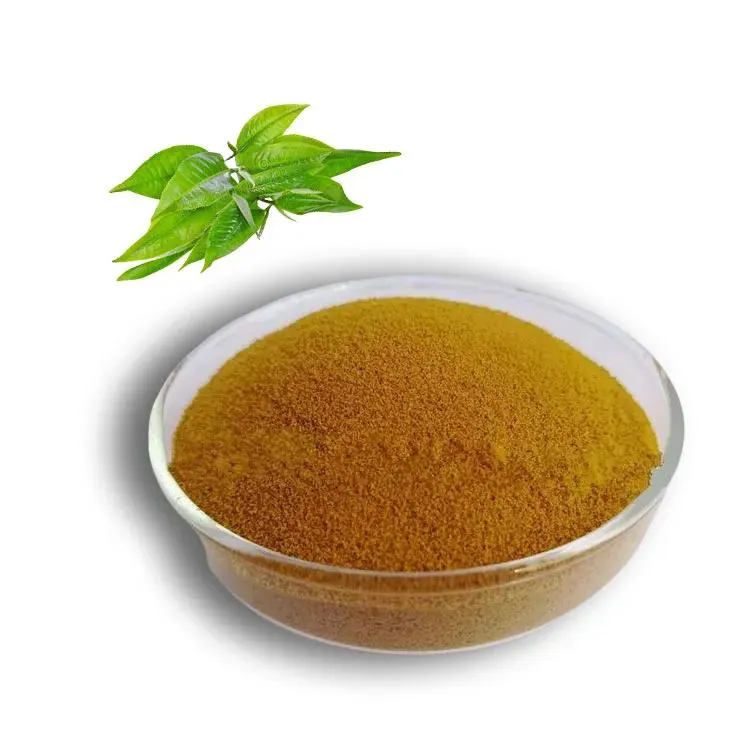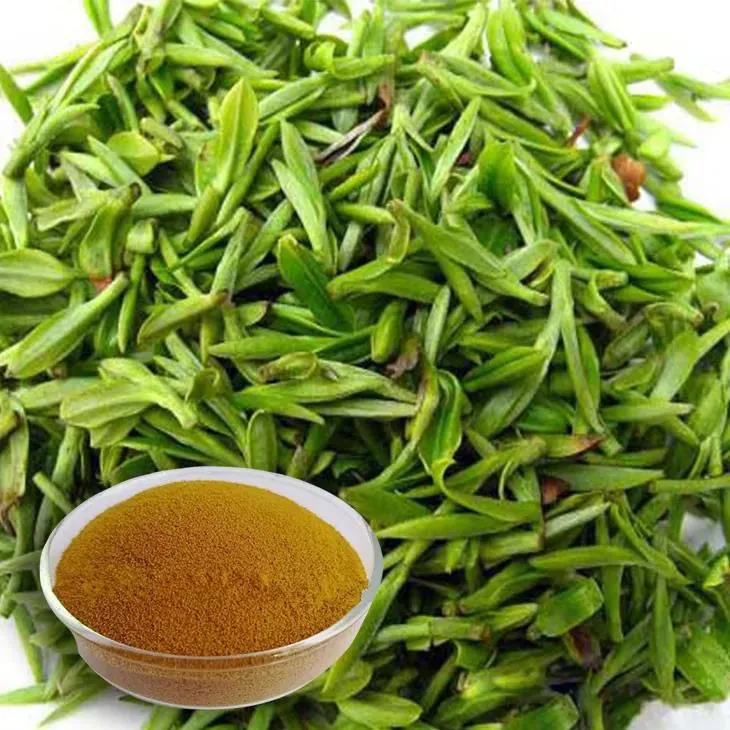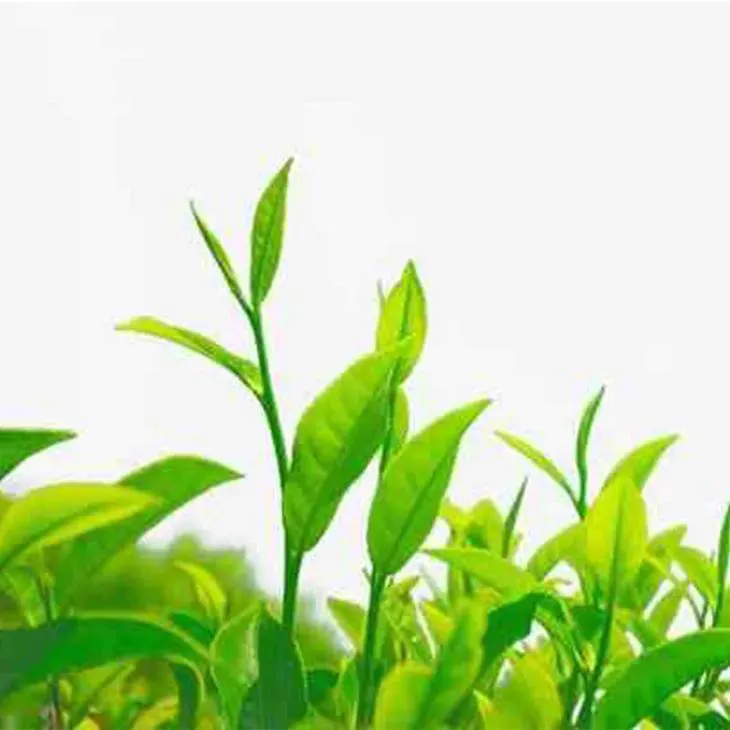- 0086-571-85302990
- sales@greenskybio.com
Who Shouldn’t Take Green Tea Extract?
2025-03-18

Green Tea Extract, derived from the leaves of the Camellia sinensis plant, is a popular dietary supplement praised for its concentrated health benefits. Rich in antioxidants such as catechins, especially epigallocatechin gallate (EGCG), Green Tea Extract is often linked to weight loss, improved metabolism, heart health, and protection against oxidative stress. While Green Tea Extract is widely used by individuals seeking to boost their overall well-being, it is not suitable for everyone. Some individuals might experience adverse effects or face health risks due to pre-existing conditions or medication interactions.
This article explores who should avoid green tea extract and explains the potential risks, side effects, and precautions for its use.
What Is Green Tea Extract?
Green tea extract is a concentrated version of green tea, containing high levels of polyphenols, catechins, and caffeine. These compounds are known for their health-promoting properties, such as reducing inflammation, supporting cardiovascular health, boosting weight-loss efforts, and improving brain function. While a steaming cup of green tea is soothing, green tea extract allows consumers to receive a more potent dose of its active compounds, making it convenient for supplementation.
However, the concentrated nature of green tea extract also makes it more likely to cause side effects or interactions, particularly when taken in high doses or by people in certain at-risk categories. Understanding who shouldn't take green tea extract is crucial to ensure safe and responsible use.

Who Shouldn’t Take Green Tea Extract?
Green tea extract may not be suitable for everyone. Below are the key groups of individuals who should avoid using the supplement or consult a healthcare professional before considering it.
People with Liver Disorders or Liver Conditions
Green tea extract is known to have a potential impact on liver health, particularly when consumed in excessive doses. High levels of catechins, especially EGCG, can overwhelm the liver and lead to liver toxicity in sensitive individuals. In rare cases, this can result in elevated liver enzymes, hepatitis, or even liver failure.
People with pre-existing liver conditions, such as hepatitis, cirrhosis, or non-alcoholic fatty liver disease (NAFLD), should avoid green tea extract or use it only under medical supervision. To mitigate risks, it’s essential to stick to the recommended dosage provided by the manufacturer and purchase supplements from reputable brands.
Individuals Who Are Sensitive to Caffeine
Green tea extract naturally contains caffeine, which is a stimulant known to enhance energy levels and focus. However, individuals who are sensitive to caffeine or experience conditions like insomnia, anxiety, or heart palpitations may find green tea extract aggravates these issues. Common side effects of excessive caffeine intake include:
Jitters or restlessness
Increased heart rate (tachycardia)
Anxiety or panic attacks
Digestive upset, such as nausea or acid reflux
If you are highly sensitive to caffeine or suffer from conditions exacerbated by stimulants, you might want to avoid green tea extract or opt for a decaffeinated version.
Pregnant and Breastfeeding Women
Green tea contains moderate amounts of caffeine, and high caffeine intake is generally discouraged during pregnancy and breastfeeding. Excessive caffeine consumption during pregnancy has been linked to increased risks of low birth weight, preterm birth, and miscarriage. Additionally, caffeine can pass through breast milk, potentially affecting the nursing infant.
Green tea extract is far more concentrated than brewed green tea, making it even more likely to lead to excessive caffeine intake. Pregnant and breastfeeding women should consult their doctor before taking green tea extract to determine its safety and appropriate dosage.
People with Iron Deficiency or Anemia
The catechins in green tea extract can reduce the body’s ability to absorb iron from food, particularly non-heme iron (iron from plant sources). For individuals with existing iron deficiency or anemia, frequent consumption of green tea extract may exacerbate the problem. Green tea extract may also decrease the effectiveness of iron supplements if taken too closely together.
To reduce this risk, those with low iron levels should consume green tea extract several hours before or after iron-rich meals or iron supplementation, or consider avoiding the supplement entirely.
Individuals Taking Anticoagulants or Blood-Thinning Medications
Green tea extract may interfere with blood clotting, as it contains compounds that have anti-platelet properties. For individuals taking blood-thinning medications, such as warfarin or aspirin, green tea extract can increase the risk of excessive bleeding or bruising.
If you are on anticoagulants or have a bleeding disorder, consult a healthcare professional before using green tea extract, as it may interact with your medications or exacerbate existing conditions.
People with High Blood Pressure or Heart Conditions
Due to its caffeine content, green tea extract has a stimulating effect that can cause a temporary rise in blood pressure or heart rate. This poses a potential concern for individuals with hypertension or cardiovascular conditions like arrhythmias or tachycardia.
While moderate caffeine intake is usually safe for healthy individuals, those with heart-related issues should avoid green tea extract or choose decaffeinated options to prevent adverse effects on the cardiovascular system.
Individuals with Herbal Allergies
Green tea extract is derived from green tea leaves, which may contain plant compounds that could trigger allergic reactions in sensitive individuals. If you have a history of herbal allergies or plant-based sensitivities, you may experience symptoms such as itching, skin rash, or difficulty breathing after taking green tea extract. If any adverse reaction occurs, discontinue use immediately and seek medical attention.

Potential Side Effects of Green Tea Extract
Even among individuals who are not part of the above risk groups, green tea extract may still cause side effects when taken in excessive doses. These may include:
Headaches
Digestive upset (e.g., nausea, diarrhea, or stomach pain)
Dizziness
Sleep disturbances (if taken near bedtime due to caffeine content)
These side effects can often be avoided by taking green tea extract according to the recommended dosage and avoiding other sources of caffeine.

Best Practices for Safe Use
If you are considering green tea extract as part of your supplement regimen, follow these best practices to ensure safety:
Stick to Recommended Dosages: Never exceed the daily dosage listed on the product label.
Choose High-Quality Products: Purchase green tea extract from reputable brands that are tested for purity and safety.
Consult a Healthcare Professional: If you have pre-existing health conditions or take prescription medications, seek medical advice before starting green tea extract.
Monitor Your Health: Be aware of any unusual side effects and stop using the product if adverse reactions occur.
Conclusion
While green tea extract is a powerhouse of health benefits, it is not suitable for everyone. Certain groups of individuals—including those with liver disorders, caffeine sensitivity, pregnant women, and people with anemia or heart conditions—should exercise caution or avoid the supplement altogether. Additionally, individuals taking anticoagulants or other medications that may interact negatively with green tea extract should consult their healthcare provider before using it.
With proper guidance, responsible usage, and attention to dosage, green tea extract can be a valuable addition to a healthy lifestyle for many individuals. However, for those in at-risk groups, alternative solutions may be more appropriate to support overall health and wellness.
- ▶ Hesperidin
- ▶ citrus bioflavonoids
- ▶ plant extract
- ▶ lycopene
- ▶ Diosmin
- ▶ Grape seed extract
- ▶ Sea buckthorn Juice Powder
- ▶ Beetroot powder
- ▶ Hops Extract
- ▶ Artichoke Extract
- ▶ Reishi mushroom extract
- ▶ Astaxanthin
- ▶ Green Tea Extract
- ▶ Curcumin Extract
- ▶ Horse Chestnut Extract
- ▶ Other Problems
- ▶ Boswellia Serrata Extract
- ▶ Resveratrol Extract
- ▶ Marigold Extract
- ▶ Grape Leaf Extract
- ▶ blog3
- ▶ blog4
- ▶ blog5
-
Is Green Tea Good for Your Kidneys?
2025-03-18
-
What Is the Best Green Tea Extract?
2025-03-18
-
Is Green Tea Extract Anti-Inflammatory?
2025-03-18
-
What Is Green Tea Extract For?
2025-03-18
-
Pueraria Lobata Extract
2025-03-18
-
melatonin extract
2025-03-18
-
Tamarind extract powder
2025-03-18
-
Cocoa Extract
2025-03-18
-
Nettle Root Extract
2025-03-18
-
Wheat Germ Extract
2025-03-18
-
Nettle leaf extract
2025-03-18
-
Eucommia Ulmoides Extract
2025-03-18
-
Purple Sweet Potato Extract
2025-03-18
-
Lemon Extract
2025-03-18






























